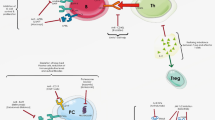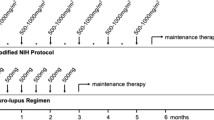Abstract
Background
Thiopurine methyltransferase (TPMT) enzymes play a crucial role in azathioprine metabolism. Mutations in the enzyme initiate generation of excess thioguanine, which causes suppression of various cell lineages.
Objectives
The objectives of this study were to investigate the prevalence of TPMT mutation in Bangladeshi patients with systemic lupus erythematosus (SLE) requiring azathioprine therapy and its relation to the development of myelosuppression.
Methods
250 patients with SLE were enrolled, then monitored for myelosuppression adverse events for 4 months. TPMT*3C (rs1142345), TPMT*3B (rs1800460), and TPMT*2 (rs1800462) polymorphisms were analyzed using polymerase chain reaction–restriction fragment length polymorphism. The risk of myelosuppression (i.e., leukopenia, thrombocytopenia, and anemia) was estimated as the odds ratio (OR) with 95% confidence intervals (CIs) and p values.
Results
Of the 250 patients, 17 (6.8%) were heterozygous for the TPMT*3 mutation and 233 (93.2%) were homozygous for the wild type; no patients carried a homozygous mutation. Grade III/IV leukopenia, thrombocytopenia, and anemia occurred in 12.0%, 12.0%, and 27.9% of wild-type TPMT patients respectively; corresponding rates in heterozygous TPMT*3C patients were 70.6%, 64.7%, and 5.9%. Patients with Grade III/IV azathioprine-induced leukopenia were significantly more likely to have the heterozygous TPMT*3C genotype than the wild-type variant (OR 17.6; 95% CI 5.8–53.6; p < 0.0001), with comparable results for Grade III/IV azathioprine-induced thrombocytopenia (OR 13.4; 95% CI 4.6–39.2; p < 0.0001).
Conclusion
Patients with SLE carrying the TPMT*3C heterozygous genotype are at risk of azathioprine-induced myelosuppression.
Similar content being viewed by others
References
Tan EM, Cohen AS, Fries JF, et al. The 1982 revised criteria for classification of SLE. Arthritis Rheum. 1982;25(11):1271–7.
Schütz E, Gummert J, Mohr F, et al. Azathioprine-induced myelosuppression in thiopurine methyltransferase deficient heart transplant recipient. Lancet. 1993;341(8842):436.
Lennard L. TPMT in the treatment of Crohn’s disease with azathioprine. Gut. 2002;51(2):143–6.
Lennard L, Van Loon JA, Weinshilboum RM. Pharmacogenetics of acute azathioprine toxicity: relationship to thiopurine methyltransferase genetic polymorphism. Clin Pharmacol Ther. 1989;46(2):149–54.
Srimartpirom S, Tassaneeyakul W, Kukongviriyapan V, et al. Thiopurine S-methyltransferase genetic polymorphism in the Thai population. Br J Clin Pharmacol. 2004;58(1):66–70.
Chen D, Lian F, Yuan S, et al. Association of thiopurine methyltransferase status with azathioprine side effects in Chinese patients with systemic lupus erythematosus. Clin Rheumatol. 2014;33(4):499–503.
Steimer W, Potter JM. Pharmacogenetic screening and therapeutic drugs. Clin Chim Acta. 2002;315(1–2):137–55.
Nguyen CM, Mendes MA, Ma JD. Thiopurine methyltransferase (TPMT) genotyping to predict myelosuppression risk. PLoS Curr. 2011;3:RRN1236.
Boonsrirat U, Angsuthum S, Vannaprasaht S, et al. Azathioprine-induced fatal myelosuppression in systemic lupus erythematosus patient carrying TPMT*3C polymorphism. Lupus. 2008;17(2):132–4.
Lennard L. The clinical pharmacology of 6-mercaptopurine. Eur J Clin Pharmacol. 1992;43(4):329–39.
Hochberg MC. Updating the American College of Rheumatology revised criteria for the classification of systemic lupus erythematosus. Arthritis Rheum. 1997;40(9):1725.
Touma Z, Urowitz MB, Taghavi-Zadeh S, et al. Systemic Lupus Erythematosus Disease Activity Index 2000 Responder Index 50: sensitivity to response at 6 and 12 months. Rheumatology (Oxford). 2012;51(10):1814–9.
Drugs.com. Azathioprine. https://www.drugs.com/mtm/azathioprine.html. Accessed 18 June 2018
US Department of Health and Human Services. National Cancer Institute: Common Terminology Criteria for Adverse Events (CTCAE) Version 4.0 [Internet] Bethesda (MD): National Cancer Institute; 2009. [cited 2019 Nov 20]. Available from: http://ctep.cancer.gov/protocolDevelopment/electronic_applications/ctc.htm
Nahid NA, Apu MN, Islam MR, et al. DPYD* 2A and MTHFR C677T predict toxicity and efficacy, respectively, in patients on chemotherapy with 5-fluorouracil for colorectal cancer. Cancer Chemother Pharmacol. 2018;81(1):119–29.
Weber WW. The legacy of pharmacogenetics and potential applications. Mutat Res. 2001;479(1–2):1–18.
Sandborn W, Sutherland L, Pearson D, et al. Azathioprine or 6-mercaptopurine for inducing remission of Crohn’s disease. Cochrane Database Syst Rev. 2000;2:CD000545.
Weinshilboum RM, Sladek S, Klumpp S. Human erythrocyte thiol methyltransferase: radiochemical microassay and biochemical properties. Clin Chim Acta. 1979;97(1):59–71.
Tai HL, Krynetski EY, Yates CR, et al. Thiopurine S-methyltransferase deficiency: two nucleotide transitions define the most prevalent mutant allele associated with loss of catalytic activity in Caucasians. Am J Hum Genet. 1996;6(4):694–702.
McLeod HL, Pritchard SC, Githang’a J, et al. Ethnic differences in thiopurine methyltransferase pharmacogenetics: evidence for allele specificity in Caucasian and Kenyan individuals. Pharmacogenetics. 1999;9(6):773–6.
Krynetski EY, Schuetz JD, Galpin AJ, et al. A single point mutation leading to loss of catalytic activity in human thiopurine S-methyltransferase. Proc Natl Acad Sci USA. 1995;92(4):949–53.
Sahasranaman S, Howard D, Roy S. Clinical pharmacology and pharmacogenetics of thiopurines. Eur J Clin Pharmacol. 2008;64(8):753–67.
Schaeffeler E, Fischer C, Brockmeier D, et al. Comprehensive analysis of thiopurine S-methyltransferase phenotype-genotype correlation in a large population of German-Caucasians and identification of novel TPMT variants. Pharmacogenetics. 2004;14(7):407–17.
Zhang JP, Guan YY, Xu AL, et al. Gene mutation of thiopurine S-methyltransferase in Uygur Chinese. Eur J Clin Pharmacol. 2004;60(1):1–3.
Kapoor G, Maitra A, Somlata, et al. Application of SNaPshot for analysis of thiopurine methyltransferase gene polymorphism. Indian J Med Res. 2009;129(5):500–5.
Dubinsky MC, Lamothe S, Yang HY, et al. Pharmacogenomics and metabolite measurement for 6-mercaptopurine therapy in inflammatory bowel disease. Gastroenterology. 2000;118(4):705–13.
Kirschner BS. Safety of azathioprine and 6-mercaptopurine in pediatric patients with inflammatory bowel disease. Gastroenterology. 1998;115(4):813–21.
Dubinsky MC, Yang H, Hassard PV, et al. 6-MP metabolite profiles provide a biochemical explanation for 6-MP resistance in patients with inflammatory bowel disease. Gastroenterology. 2002;122(4):904–15.
Kapoor G, Sinha R, Naithani R, et al. Thiopurine S-methyltransferase gene polymorphism and 6-mercaptopurine dose intensity in Indian children with acute lymphoblastic leukemia. Leuk Res. 2010;34(8):1023–6.
Present DH, Meltzer SJ, Krumholz MP, et al. 6-Mercaptopurine in the management of inflammatory bowel disease: short- and long-term toxicity. Ann Intern Med. 1989;111(8):641–9.
Acknowledgements
The authors are thankful to the patients, volunteers, nurses, physicians, and scientists of Bangabandhu Sheikh Mujib Medical University (BSMMU). The authors are also thankful to the Department of Clinical Pharmacy and Pharmacology, Faculty of Pharmacy, University of Dhaka, Bangladesh for providing the opportunity to carry out the research work.
Author information
Authors and Affiliations
Contributions
MMUR, IA, and MAI collected samples and carried out the study. TT, NAN, MNHA, MRI, and SS drafted the manuscript. AH, MSI, MUA, KY, and HMR conceived the study design and performed statistical analysis. MMAAM, MK, MNI, and HMR guided the study conducted in laboratory and performed the evaluation. MUA, MSI, KY, and HMR checked the manuscript and suggested improvements. All authors discussed, provided conceptual comments on, and approved the final manuscript.
Corresponding authors
Ethics declarations
Funding
The authors received no financial support for the research, authorship, and/or publication of this article.
Conflict of interest
Mohammad Mamun Ur Rashid, Imtiaz Ahmed, Md. Asraful Islam, Tasnova Tasnim, Noor Ahmed Nahid, Mohd Nazmul Hasan Apu, Mir Md. Abdullah Al-Mamun, Md. Reazul Islam, Maizbha Uddin Ahmed, Masud Karim, Md. Nazrul Islam, Kazushige Yokota, Samia Shabnaz, Hasan Mahmud Reza, Mohammad Safiqul Islam, and Abul Hasnat have declared that they have no conflicts of interest.
Ethical approval
The study was conducted in accordance with the Helsinki Declaration and its further amendments, and the ethical committee of the participating hospital approved the study protocol.
Informed consent
Each patient and control subject signed an informed consent document after they were informed of the study objectives.
Electronic supplementary material
Below is the link to the electronic supplementary material.
Rights and permissions
About this article
Cite this article
Rashid, M.M.U., Ahmed, I., Islam, M.A. et al. Influence of TPMT polymorphisms on azathioprine-induced myelosuppression in Bangladeshi patients with systemic lupus erythematosus. Drugs Ther Perspect 36, 202–207 (2020). https://doi.org/10.1007/s40267-020-00716-y
Published:
Issue Date:
DOI: https://doi.org/10.1007/s40267-020-00716-y




